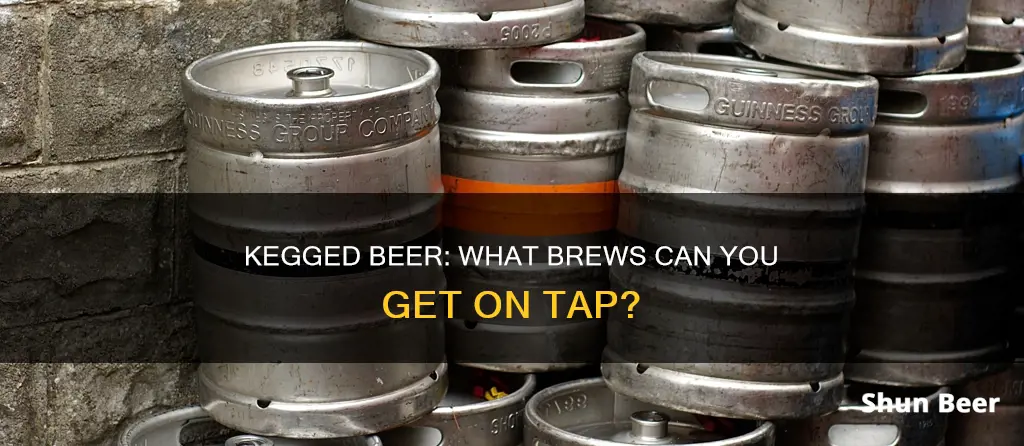
There are many different types of beer that you can buy in a keg, including Budweiser, Bud Light, Coors, Coors Light, Heineken, Miller Lite, and Stella Artois. Kegs come in various sizes, such as the half barrel, quarter barrel, sixth barrel, Cornelius keg, and mini-keg, with capacities ranging from 1.32 gallons to 15.5 gallons. The type of beer and the size of the keg will determine the cost, with prices ranging from $63.99 to $234.99.
Characteristics of Beer Kegs
| Characteristics | Values |
|---|---|
| Keg Sizes | Half barrel, quarter barrel, sixth barrel, Cornelius keg, mini-keg |
| Number of Beers | 14-165 12-ounce beers |
| Height | 14 inches (shortest) to 24 inches (maximum) |
| Weight | N/A |
| Beer Styles | Lager, Ale, IPA, Stout, Wheat Ale, Pale Ale, Amber/Red Ale, Pilsner, Light Beer, etc. |
| Beer Brands | Heineken, Budweiser, Bud Light, Coors, Miller, Corona, Stella Artois, Dos Equis, Guinness, etc. |
| Coupler Types | D, S, G, U, A, M |
| Price Range | $79-$234.99 |
What You'll Learn

Keg capacity and number of beers
Keg capacity and the number of beers you can get from each depend on the size of the keg. The number of beers in a keg can range from 14 to 165 12-ounce servings. Here is a breakdown of the different keg sizes and their capacities:
Half Barrel Keg (Full-Size Keg)
The half-barrel keg is the standard size used in the US brewing industry. It holds 15.5 gallons of beer, which is equivalent to approximately 124 pints or 165 12-ounce servings. Despite its name, it is actually a true half-barrel, as a full barrel of beer holds 31 gallons.
Quarter Barrel Keg (Pony Keg)
The quarter-barrel keg holds half the amount of a half-barrel keg, i.e., 7.75 gallons. This equates to approximately 62 pints or 82-83 12-ounce servings. It is perfect for smaller venues, special events, or when offering a variety of beers.
Sixth Barrel Keg (Sixtel)
The sixth-barrel keg, or sixtel, holds 5.16 gallons of beer, which is about 42 pints or 55 12-ounce servings. It is commonly used for specialty and craft beers that may not be consumed as quickly as mainstream beers.
Cornelius Keg (Corny Keg)
The Cornelius keg, also known as the Corny keg, was originally designed for dispensing soft drinks but has become popular among homebrewers. It holds 5 gallons or 640 ounces of beer, which translates to around 53 12-ounce servings or 40 16-ounce pints.
Mini Keg (Bubba Keg)
The mini keg is perfect for small gatherings, holding 1.32 gallons or about 14 12-ounce servings. Heineken mini kegs are one of the most popular options in this size.
Montana Beer Laws: Sunday Sales Explained
You may want to see also

Keg couplers
There are several different kinds of keg couplers, with letter names: A, D, G, M, S, and U. They look similar, but they are not interchangeable, so it's important to ensure you have the correct one for your keg.
As a rule of thumb, here is what each coupler tends to work with:
- D Coupler: Works with North American kegs, including Yuengling, Miller, Budweiser, Coors, and most beers brewed in North America.
- S Coupler: Works with most European kegs, including Heineken, Stella Artois, Amstel, and many more.
- G Coupler: Works with a few European kegs.
- U Coupler: Works with a few European kegs, including Guinness, Harp Lager, and Kilkenny.
- A Coupler: Works with most German kegs, including Hoegaarden, Isenbeck, and Aigner.
- M Coupler: Works with a few German kegs.
If you are unsure which coupler your keg needs, it is best to consult a beer specialist or refer to a master list of keg couplers.
Beer at Dawn: Tennessee's Early Morning Drinking Laws
You may want to see also

Pasteurized vs unpasteurized beer
When buying beer in a keg, you may come across the terms "pasteurized" and "unpasteurized". Pasteurization is a process that heats a liquid to a temperature that kills off bacteria and dangerous microbes. This process was first invented by French scientist Louis Pasteur in 1873, who sought to make French beer tastier.
Pasteurized Beer
Most commercial and mass-produced beers are pasteurized, including Budweiser, Coors, and Miller. Pasteurization extends the shelf life of the beer, allowing a bottle of pasteurized beer to remain fresh-tasting for about six to nine months, and even up to a year if refrigerated. The beer is also more stable and uniform, which is beneficial for the brewer as they have minimal control over the conditions and length of time packaged beer will be stored.
Unpasteurized Beer
Craft breweries rarely pasteurize their beers, and unpasteurized beer is often referred to as "live" beer. The alcohol in the beer kills off any harmful bacteria, so it is safe to drink. Unpasteurized beer has a shorter shelf life of about two to six months, depending on packaging and refrigeration.
Unpasteurized beer has several benefits. Firstly, it has better taste as it has not been subjected to heat, which can alter the flavor. Secondly, it has better health benefits as the live yeast is one of the most effective ways of getting vitamin B complexes, which can also help counteract hangovers. Finally, unpasteurized beer contains live lactobacillus, which is beneficial bacteria found in fermented vegetables and dairy products.
Examples of Pasteurized and Unpasteurized Beer
Popular brands of pasteurized beer include Budweiser, Coors, and Miller. Keg beer brewed and packaged in the US is generally not pasteurized, although some larger brands such as Budweiser, Coors, and Miller do pasteurize their keg beers.
Examples of unpasteurized beer include those from North Coast Brewing Co., Great Divide Brewing Co., Logsdon Farmhouse Ales, and Widmer Brewing Company.
Chang Beer: Where to Buy in the USA
You may want to see also

Keg height
The height of a beer keg depends on its size and model. The shortest keg is the stubby quarter barrel, which measures just under 14 inches in height. The maximum height of most other keg sizes is under 24 inches.
The Cornelius keg, or Corny Keg, is tall and cylindrical and usually measures 23" x 9". It was originally designed to store, distribute, and dispense soft drinks, but its five-gallon capacity and easy-to-fill-and-clean design have made it popular with homebrewers.
The Quarter Barrel Keg, also known as the Pony Keg or Stubby Quarter, is short and stubby, with a width of 16⅛" and a height of 13⅞". It holds 7.75 gallons, which is perfect for small parties.
The Slim Quarter holds the same amount of beer as the Quarter Barrel but is taller and thinner, with a height of 23⅜" and a width of 11⅛". This keg is a popular choice for dual-tap kegerators.
The Half Barrel Keg is the largest standard keg, holding 15.5 gallons of beer. It's what most people picture when they think of a beer keg, and it's commonly used in bars and restaurants. It will fit in most home kegerators, but the smaller keg sizes are more popular with craft beer drinkers.
The 50-litre keg is the standard in Europe, including the UK. It's similar in size to the American Half Barrel Keg.
Buying Beer Late on Saturday Nights: What's the Legal Limit?
You may want to see also

Keg cost
The cost of a keg of beer depends on several factors, including the size, brand, and location of purchase.
Keg Sizes
Kegs come in various sizes, including the half barrel, quarter barrel, sixth barrel, Cornelius keg, and mini-keg. The amount of beer in a keg can range from 14 to 165 12-ounce servings. The half barrel, or full-size keg, holds 15.5 gallons or 165 12-ounce beers, while the quarter barrel, also known as a pony, stubby, or slim quarter keg, holds 7.75 gallons or 83 12-ounce servings. The sixth barrel, or "sixteen," holds 5.2 gallons or 55 12-ounce beers. The Cornelius keg, or "corny keg," holds 5 gallons or 53 12-ounce servings, and the mini-keg, or "bubba keg," holds 1.32 gallons or 14 12-ounce beers.
Brand and Location
The brand of beer also affects the cost of a keg. For example, a half keg of Dos Equis Amber costs around $158 plus a deposit, while a half keg of Stieglitz Grapefruit is priced at $220 plus deposit. The deposit is usually a small amount, typically around $15. The market and location of purchase can also impact the price. For instance, a half-barrel keg of Bud Light can range from $79 to $139, depending on the distributor and the state.
Additional Costs
In addition to the cost of the keg and deposit, there may be extra charges for a party pump or tap, which can range from $50 to $100, with a rental fee of around $10. It is worth noting that the cost per pint may be lower when purchasing a keg compared to individual cans, but the savings may be offset by the need to provide cups for guests.
Examples of Keg Prices
- Budweiser 1/2 Barrel: 15.5 gallons, 124 pints
- Bud Light 1/2 Barrel: 15.5 gallons, 124 pints
- Miller Lite 1/2 Barrel: 15.5 gallons, 124 pints
- Stella Artois 1/2 Barrel: 15.5 gallons, 124 pints ($199.99)
- Coors Light 1/2 Barrel: 15.5 gallons
- Genesee Regular/Light/Cream Ale 1/2 Barrel: 15.5 gallons, 124 pints
- Michelob Ultra 1/2 Barrel: 15.5 gallons, 124 pints
Buying Beer on Christmas Day in North Carolina
You may want to see also
Frequently asked questions
Popular beer brands that can be bought in a keg include Budweiser, Bud Light, Coors, Coors Light, Miller Lite, Michelob Ultra, Stella Artois, and Yuengling.
The different sizes of beer kegs include the half barrel, quarter barrel, sixth barrel, Cornelius keg, and mini-keg. The capacity of these kegs ranges from 1.32 gallons to 15.5 gallons.
The number of beers in a keg depends on the size of the keg. A keg can hold anywhere from 14 to 165 12-ounce beers.
Beer kegs can be purchased from various retailers, including Total Wine & More, One Stop Brew Shop, and Spirit of '76 Wines & Liquors.
The cost of a beer keg depends on the size and brand. For example, a half keg of Bud Light can range from $79 to $139, while a half keg of Dos Equis Amber costs around $158.







